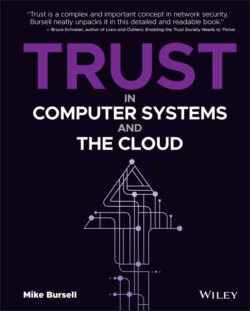Читать книгу Trust in Computer Systems and the Cloud - Mike Bursell - Страница 25
Institutional Trust
ОглавлениеA great deal of the literature on trust revolves around our trust—and mistrust—in institutions: or, as we would clarify with our new understanding about these concepts, the trust relationships we have to institutions. This type of trust is related directly to our second case in Chapter 1: my trust relationship to my bank. Banks are, in fact, a key example of institutions where their customers' or users' trust is self-evidently vital. Banks and other financial institutions are so important to the smooth running of (capitalist) society that governments will not infrequently move in to prop up a bank when trust in it begins to falter. The assurance associated with trust here is generally around whether a bank has sufficient assets to be able to provide its customers with their money when requested. But there is a greater and more dangerous concern against which financial institutions—or maybe, more broadly, frameworks—must guard: trust in a currency itself. By this, we really mean there is a generally accepted assurance that the currency will hold its value over time, or at least not deviate (particularly downwards) too sharply over time in terms of its purchasing power.
It has become clear, with the rise of blockchain-backed crypto-currencies as an alternative (for some) to traditional fiat currencies, that the types of assurance, and how they are managed, are more complex than had generally been assumed. This topic is so important for our understanding of how trust is embodied in a particular set of systems that we will return to crypto-currencies in more detail in Chapter 6, “Blockchain and Trust”.
For now, we will concentrate on more traditional institutions and some of the discussions on how trust is relevant to them. It should come as no surprise that this is a topic that has garnered a great deal of attention over the years. The idea that institutions are required because individual humans cannot “scale” to provide all of the services required is clearly not new. Monarchs and generals have appeared to manage large groups of people, trustworthy individuals have been appointed to dispense justice (at, for instance, Jethro's urging to Moses in Exodus 18), and the people who they serve—or are supposed to serve—need to have a trust relationship to them.
